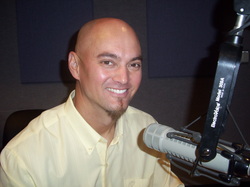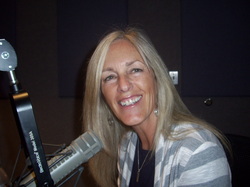Changing the way people look at end of life

Callan Loo with Peaceful Crossings
We had the good fortune to have two guests from Peaceful Crossings with us on the radio show this weekend. Callan Loo is the president and Tamara Sutton is the director of coaching services. As Cal explained, Peaceful Crossings was “created to make the idea of death not so scary, the mission is to improve the way society views and plans for death.”
While they offer many products and services, we focused our discussion on the Peaceful Crossings Plan. This service is about planning out your own legacy, and it’s really not about dollars. Each of us has lived a life, and we leave a legacy. This legacy is the ripple effect of our life, how we have affected our family, friends and the whole community.

Tamara Sutton with Peaceful Crossings
Photos by Sheila Doeden
The Peaceful Crossings Plan seems a good value at $329, especially as it includes three hours with a certified legacy coach. The coaching is important as it helps to educate on the many options and alternatives available. Interestingly, as Tamara added, when people go through the planning kit process, they start to think more about their life, what conversations they need to have, and what else they still want to do with their life.
The workbook and storage folio that are the core of the plan become very valuable at end of life. Family loved ones have the important financial and legal documents, as well as a clear direction on the preferences for the memorial service.
Cal shared how one client didn’t want a memorial service at all. The client reconsidered after they talked through how the service can be very helpful for those you leave behind. It’s an opportunity to grieve and celebrate your life.
We also had an opportunity to talk with Tamara about grief coaching. She stressed the importance of “leaning into your grief.” You have to actively participate in the process. Keeping a journal of your feelings can be really helpful. There is also joy in the grieving process, remembering the good times, keeping the memories alive.
To listen to the first half of our 25-minute talk with Callan and Tamara, click the audio link:
To continue with the second half, click the audio link:
To get in touch with Callan Loo, Tamara Sutton, or Peaceful Crossings, call 888-732-2346, or access their website peacefulcrossings.com.
Alan Caldwell and Sheila Doeden co-host Everything Elderly every Saturday morning at 8:30 on 1290 WLBY. In their day jobs, Alan and Sheila co-own and co-manage Senior Helpers, providing in-home care services, primarily to the elderly. Both can be contacted at homecareexcellence@seniorhelpers.com, or at 734-927-3111.


Comments
BhavanaJagat
Mon, Oct 17, 2011 : 4:55 p.m.
WHAT IS DEATH ? : I thank Cassandra for sharing her comment. Feelings of grief, mental wounds and injuries must be fully exposed to help their healing. This post has not discussed the issue of death. We must know that there is a difference between death and the dying process. The Identity of an Individual is established in the physical world by the dying process. The newborn individual arrives in the world with an Identity of its own because of the dying process. Before the fact of physical birth, it is the dying process that shapes the Identity of that person who is being born into this world. The dying process is described as 'Programmed Cell Death'. Certain number of cells have to die to establish the size, the shape, the features of the new person. Even the internal organs have sizes, shapes, and features. If there is no dying process, there is no Identity and there is no Individuality. During the course of Life's Journey, cell death is a daily event. The Identity passes through various stages called infancy, boyhood, adult, and old age. The Identity changes during all the stages of Life and yet the Individuality remains the same. The Individuality remains unchanged even when the Individual constantly experiences death in his daily life. Cell Death is a daily event and it is important for human existence. For example, the red blood cells are replenished at regular intervals through the entire course of life. If you get a scratch, the wound healing process involves the removal of dead cells and replacing them by new cells. Death is a daily and recurrent event and we do not recognize it as the Individuality defeats the dying process and survives in spite of death. While living, we conquer death in each day of our lives. If this is a scientific fact, it will not be illogical to seek belief in the Resurrection of Christ who had conquered the Sin described as Death. <a href="http://bhavanajagat.com/2011/06/08/identity-and-individuality/" rel='nofollow'>http://bhavanajagat.com/2011/06/08/identity-and-individuality/</a>
Cassandra
Mon, Oct 17, 2011 : 1:53 p.m.
I find it difficult to believe that anyone but a masochist could find "joy in the grieving process." There is no one-size-fits-all way of dealing with bereavement grief. The Mayo Clinic and Harvard Medical School recognized only in the past few years that there is a particularly deep form of bereavement grief that they call "complicated grief" that does not respond to the facile advice of "remember the good times." After his wife died, Northrup Frye dealt with this in his Notebooks; he said that telling a grieving spouse to remember the good times is like telling a starving man to remember the banquet he had a month ago. For those deep in grief, recalling the good times, "keeping the memories alive" just reinforces the knife-like sense of loss. When my husband died suddenly and unexpectedly, the grief was overwhelming. "How long does it take?" I asked friends who had lost a spouse. Answers varied --- from a year to 2 years to "as long as it takes." Though I kept busy, went back to work, helped and mentored others, it took almost eight years. When my husband died, I could not stop crying -- literally. An older widow said to me, "Don't think your pain is any deeper than anyone else's." She meant it kindly, but all I could think was that I could not believe that a human being could feel such excruciating pain without dying. Everyone's marriage is different; everyone's relationship with a departed loved one is different, personalities are different, temperaments are different. How does one compare the grief of a young war widow with that of a widow with grandchildren who nursed her dying husband through his last illness? It's apples and oranges, and to offer advice is almost insulting. Bottom line: There's no easy way to get through bereavement grief; if we're lucky, the best that can come out of it is finally a sense of peace and the ability to be able to be there for others.
Alan Caldwell
Mon, Oct 17, 2011 : 11:21 p.m.
Cassandra, thank you very much for your thoughtful comments. You are right, every death is different and everyone grieves differently. I can speak for my personal, very recent experience. My wife passed away six weeks ago to breast cancer. I miss her terribly. But I have also found some "joy" in the grieving process, as family and friends have shared wonderful stories about her life. And some of them are even amusing, and I've laughed. My wife wanted her memorial service to be a "celebration" of her life, and that's what we had. While we all mourned, we also shared smiles thinking about all the joy she had in her life.